- HOME
- Alumni News
- Activity Reports
- Activity Report of Sarin san(Cambodia)
Activity Reports
Activity Report of Sarin san(Cambodia)
HHC Annual Report 2015
Message from Founder/ Executive Director
Being the Executive Director, it is not only about the role but it is about responding to the call from children with special need who are living in the communities. Back in 2012, I was praying for guidance. I could see the needs and heard the cries of children with intellectual disabilities. My heart was definitely open to start, even though I did not know what the future would be like. I trusted that God knew, and so I devoted myself to start this ministry now called ‘Hands of Hope Community’.
Since its birth, Hands of Hope Community has been growing into a ministry that impacts hundreds of lives, especially vulnerable children with intellectual disabilities in Cambodia through empowering the community and families and engaged with government to be more responsive. We have found that a holistic approach is necessary for sustainable transformation. In 2015, we worked with more than 50 children with special needs and their families in Kandal province.
Finally, I would like to thank you very much for standing with me and trusting in us to do what we are called to do. We are blessed by your prayers, friendship and partnership with us. For that, we are extremely grateful. We enter the New Year 2016 with a great anticipation of blessings upon our work.
May you continue to join us in the journey to fulfill this great mission!
With abundant blessings,
Chan Sarin Founder/Executive Director
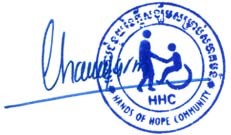
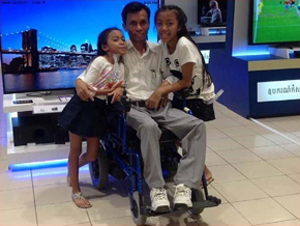
Organization Background
The Hands of Hope Community was born from the simple beginning of a small research conducted in a semi-urban area of Takmao town; with a view to extending an existing community based program. Authorities identified 45 children and young adults with various disabilities aged 3-25 years; of these 15 (33%) received some kind of limited service, though the vast majority 30 (66%) received no support whatsoever. On further investigation families clearly expressed a desire for day-care services that would primarily help their child develop in the company of others, whilst also enabling themselves the freedom to go out to work in the knowledge that their child is safe and cared for.
In December 2012, through the passion and commitment of Mr Chan Sarin the founder and director, Hands of Hope Community was registered with the Ministry of Interior (Reg. No: 1042). The organization is mandated to provide day-care facilities, home-based care, Disability Awareness, Parents Support Group, Toy Library and inclusive education as well as to promote the needs and rights of children and youth with moderate and severe intellectual disabilities. The key to effective and sustainable outcomes for these, the most vulnerable of children is partnership with other organizations in the disability sector. There is also recognition that individual, families and communities need to be involved in the decision making at all levels within the program.
The Hands of Hope Community provides a professional and compassionate environment for children to receive the emotional, physical and social support they need, as well as the opportunity to participate in society. HHC’s methodology strives continually towards high quality individualized care provision for children with disabilities which aims to maximize independent living and integrated community living for children.
1. Special Education at Daycare Program
The special education program responds to the needs of children and youth with moderate and severe disabilities, presently there are 50 children in the program
- There are 27 children (10-girls, 17-boys), regularly attending daycare program activities such as: life-skill, art drawing, recreational activities, sport, all of which make them happy and enjoy. We have seen progresses in many children examples include: willingness to help their families with house work; assisting to prepare school materials; and together with staff and volunteers helping to clean the center and kitchen area. Other aspects that have improved through regular daycare attendance included: increased parent collaboration; children are nurtured in a safe place can have safe place; increased understanding of activities of daily living (ADL); improved social communication, hygiene and sanitation; and increasingly good physical health with some children gaining weight. Some older children are more aware about time management, have creative ideas on income generation and are more confident to participate in advocacy and awareness on disability issues.
- An additional 23 children (10-girls, 13 boys) from the Home Based Care (HBC) program attend daycare 1-2 times per month mostly because of the long distance/costs of travel in attending the center more regularly. Particular areas of progresses for HBC children involved: improved communication both with parents and neighbors; children were more confident to attend community events; noted development in both physical and mental capacity; those attending school passed to the next grade level as planned; and understood more clearly about appropriate social communication, including keeping themselves safe. Children were also more aware of their right to participate in society and had successfully made many friends in local schools, where it was noted that discrimination was reduced from previously.
- 50 children in both DC and HBC were provided nutritional food each week (Soya milk), in addition 27 in DC received daily food (lunch) and snack (breakfast).
- 8 children at the DC received special therapy sessions enabling them to improve their mobility - walking, moving around and sitting correctly (enhanced cross motor and fine motor skills).
- 5 wheelchairs were received from JICA through the Disability Action Council (DAC), and 14 children in HBC received therapy sessions, and additional aids such as walking frames, artificial legs and wheelchair from Phnom Penh Center for Independent Living (PPCIL), which enabled them to better access local transportation.
- Sport cultural exchanges were conducted twice for 100 children with special needs, sponsored by Osaka University of Japan and the Cambodian Intellectual Disability and Autism Network (CIDAN).
- 8 children with intellectual disabilities received monthly football training from the Star-Fish Foundation, with scheduled events against other teams 3-5 times per year. This being part of a national event related to sporting activities under the UN Convention on the Rights of Persons with Disability.
- All 50 children were assessed to have made development progress checked against their Individual Education Plans (IEP); these were completed by staff and special teachers, with input from parents.
- 12 children attended the dentist;
- 12 Children with Intellectual Disabilities (CWID) were attended by a visiting doctor sponsored by Side by Side International providing health checks and health advice to and parents. Supplement of vitamin A and de-worming treatment were also provided.
- 5 children (1 girls, 4 boys) received medication from The Center for Child and Adolescent Mental Health (CCAMH) and the Russian Hospital (1 child); these medications helping to control fitting and reduce aggressiveness.
- Each child was issued a set of hygiene supplies (towel, tooth paste and brush, soap, shampoo, mouthwash cup) which is kept in a small labeled box and used daily at the DC.
- Celebrations were held for Khmer New year (April), and Christmas (December) for children and parents to enjoy social fellowship and time together with staff.
Daycare Activities for 27 children
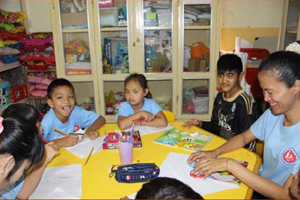
|
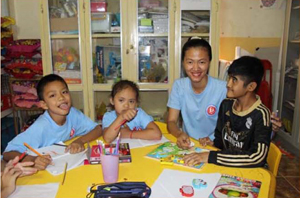
|
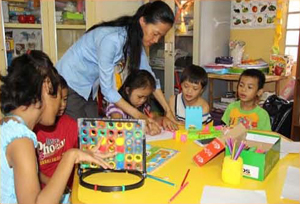
|
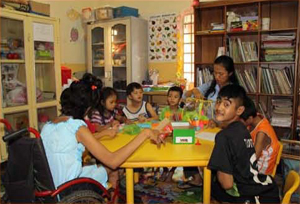
|
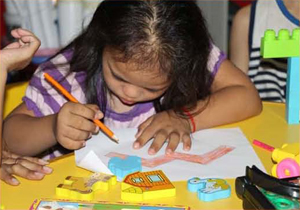
|
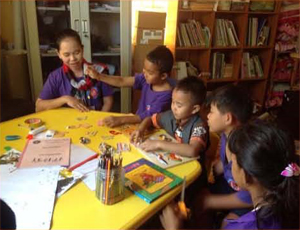
|
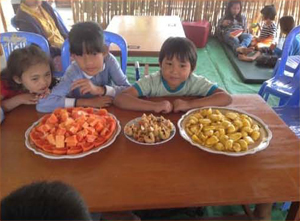
|
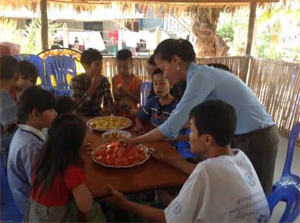
|
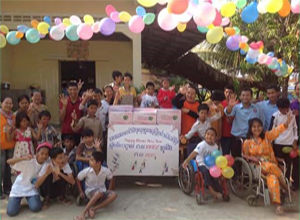
2. Home Based Care Project
- 23 children (10-girls, 13-boys) are presently registered for home-based care activities where staff visiting each family once a week in order to support children’s participation in activities and prevent feelings of isolation in the community. HBC services focused on improving ADL guided by an individual education plan (IEP), this detailing rehabilitation, prevention and health care strategies for the child.
- 15 children were provided home physical-therapy once a week by field staff and volunteers. Some children were referred by therapy staff for specialist rehabilitation services such as to Variance International Cambodia (VIC)
- 5 families were provided instruction and special materials for therapy aid to provide massage particularly for hands, improved jaw movement and wheelchair use.
- 1 child currently receives monthly check-ups and special medical care services through CCAMH.
- 2 children from HBC received dental services and 4 children received health care checkups from a Japanese doctor supported by Side by Side International organization.
- 23 families were trained on improved care for their children at home, with additional sessions provided about child protection and keeping children safe, first aid and physical rehabilitation activities in the community.
- Among the 23 families, 20 were provided additional training and instruction about individual education plans; families contributing input into the planning process, this course being important for parents to be able to provide quality care and better control behavior of the children who experience fitting and aggressiveness.
- Some additional training from Veterans International (rehabilitation) and UNDP was used. The project has also adopted some best practice shared through MoSAVY community based rehabilitation workshops.
- In a joint 2-day workshop Komar Pikar Foundation and HHC facilitated sessions on identification of autism, self-advocacy and personal interaction with people affected by autism. The workshop was also for parents and children leaders to vote for representative members. From HHC organisation 7-parents and 7-children participated.
- Advocacy - HE Morokat Nhem, Under Secretary of State for Women Affairs visited 8-families participating in the HHC HBC program, the aim of this visit being to: i) to encourage the parents and community to take more care of disabled children; ii) encourage parents that girls with disability are part of WA agenda; iii) to personally encourage girls with disability that they are not alone; iv) to spur the provincial Women Affairs and District Office of Social Affairs (DoSVY) to regularly follow up children with disabilities; v) raise awareness to reduce discrimination against disabled children in the community; and to support HHC staff to achieve their vision/mission..
Photos of HBC Activities where there are 23 children
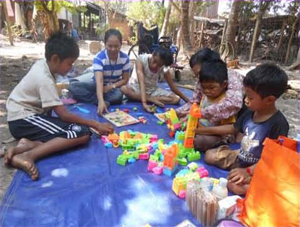
|
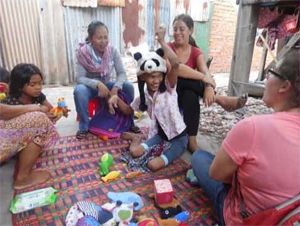
|
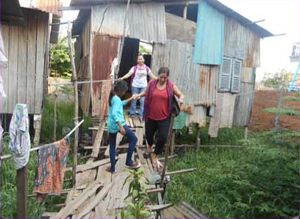
|
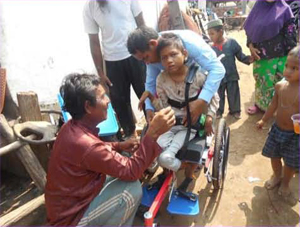
|
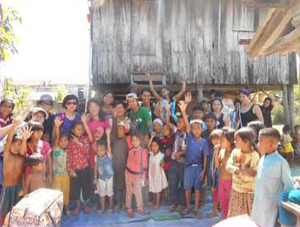
|
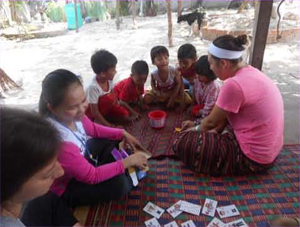
|
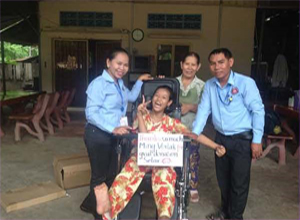
3. Awareness Raising and Advocacy Project
- HHC works in collaboration with commune council and in particular has engaged with the Commune Committee for Women and Children representative in Svay Rolum a new target commune. She reported on 10-15 CWDs in her commune where children needs help as most of were isolated from the communities and had experienced discrimination both among their families and local people. An assessment will be made on these children in Jan-Feb 2016. HHC proposes to in closer collaboration with CCWC in outreach to CWD.
- HE Minister for Information visited HHC DC on 24th August sponsoring a lunch for 150 parents/children and persons from the local community. The key note speaker committed to keep working for CWID through placing donation boxes within the ministry; broadcasting messages nationwide relating to disability rights; and providing land for development of a new day-care facility in 2016. HE and Mrs. Khieu Kanharith have very generously committed to provide a plot of land to HHC for this venture.
- In her key-note speech to the community H.E Kim Sethany Secretary of State, Ministry of Education recognised the HHC program as an effective model in helping to ensure that all children have access to education. She noted that Cambodia has not achieved the Millennium Development Goal, with reportedly 60,000 children being out of school, HHC was commended in helping to address this issue in relation to children with disabilities, in particularly children with intellectual disabilities. In acknowledgement of HHC’s efforts
H.E encouraged HHC to apply for government-staff status, which would qualify them for a state funded salary and pension. Thanks were also extended to UNICEF/CDIDF fund in support of their increasing inclusion of local organisations working directly with disabled children. - Awareness raising has been conducted both locally and nationally: 45 children participated in National Autism Day in April, the event organized by the DAC and MOSAVY and Asia and Pacific Center on Development and Disability (APCD) held at the Cambodian Japanese Cooperation Center, with 36 NGOs in attendance.
- Monthly outings for children (15-20 per time) were facilitated to the riverside and local community to connect with students and local people. Children have a picnic at a park area near to the primary school from 3-5pm talk to people, buy ice-cream and have fun together.
- Staff conducted awareness raising on disability in 5 villages in one commune -total 136 villagers attended the event; the training was based on disability prevention, early intervention and reduce discrimination among communities and local leaders.
- HHC has installed disability access facilities in 5 local schools (2 primary, 2 high school and one in secondary school), this would be great sources for children who are using wheelchairs or have artificial limbs. This included six disability access ramps were installed in one-school that previously had no access to bathrooms or classrooms.
- Big posters to promote education for children with special needs were distributed to 7 ministries, 5 provincial offices and 14 NGOs who are members of CIDAN. This promoting inclusive development and protection of the rights of children with intellectual disabilities in Cambodia.
- The HHC director and parents of a CWID, this included children with ID and Autism attended the Third Country Training Program “Knowledge Creation Forum on Community-based Inclusive Development 2015 (Capacity-building of Persons with Autism and their Parents)” conducted by the Government of Thailand and the Government of Japan as part of their Technical Cooperation Scheme in conjunction with APCD. The
general objective of the program was to empower young persons with intellectual disabilities, autism, and hard of hearing in Southeast Asian countries from the perspective of Community-based Inclusive Development. - National sporting events (special Olympic games and Recreation) were held in August and November between 8-CIDAN members; these events encouraged the children to show their abilities; promoting disability rights amongst disabled and non-disabled persons. The second event in November was attended by HE Makara Secretary General of Disability Action Council and representative of MoSAVY for CIDAN members promoted children with ID and Autism in Cambodia
- Through July – November four village awareness meetings were conducted by HBC supervisor stressing the importance of early intervention for children with disability; this following guidance from the sub-decree from government.
- Mr. Sarin, Director was invited as the key note speaker on CTN on 24th August concerning disability awareness, the importance of early intervention, children with ID and autism development in Cambodia. A further interview was conducted in December promoting HHC through TVK.
- In December the annual Camping Campaign entitled “Together reducing discrimination to children with Intellectual Disability(ID) and autism” was celebrated by all 50 children and 50 parents. The session was opened by Her Excellency Nhem Morokat, Under Secretary of State, Ministry of Women’s Affairs; and second day presided over by His Excellency Yun Min, Governor Sihanoukville.
- To celebrate the International Day of Persons with Disability (7th Dec) 25 children and 25 parents attended a national event in Phnom Penh presided over by Her Excellency Men Sam An, Deputy Prime Minister, who gave a speech promoting the national policy for disabled persons.
- Effective use of social media such as Facebook in addition to national TV coverage have helped to raise awareness amongst not only the public, but also of other government officials; thus providing HHC a platform to challenge others in prominent positions to become more engaged and responsive to disability issues and rights. Engaging effectively with key persons who have dedication and are of influence such their Excellencies – have been instrumental in highlighting and giving ‘air-time’ to disability issues. All excellencies mentioned above have been strong advocates in raising the profile of children with intellectual disabilities.
Photos of Awareness Activities
The Minister of information and his wife visited us in April and August 2015(2 times) Promoted children with Intellectual Disability (ID) and Autism in to social media
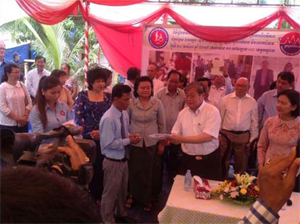
|
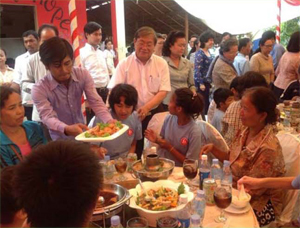
|
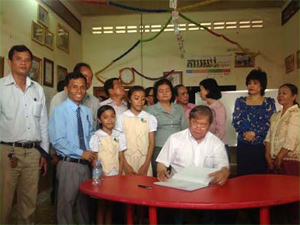
|
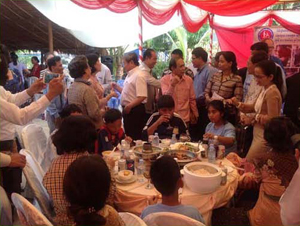
|
Secretary of State, Ministry of Education visited HHC daycare promote Autism movement
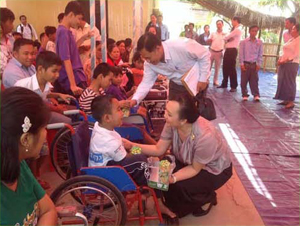
|
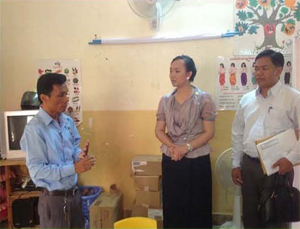
|
CIDAN Activities has been supported by APCD
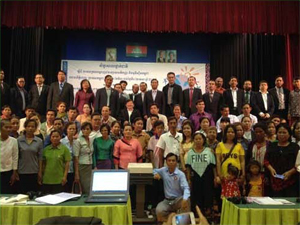
|
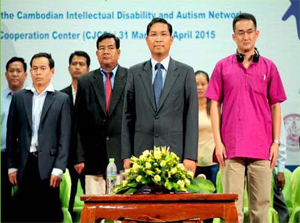
|
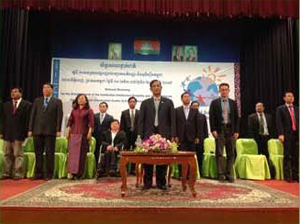
|
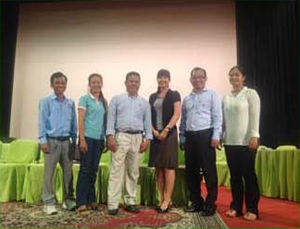
|
Sport and Fun for children with ID and Autism ( DAC & 8 CIDAN Members)
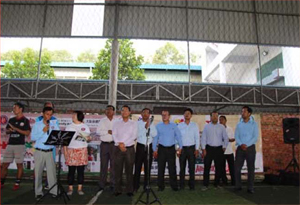
|
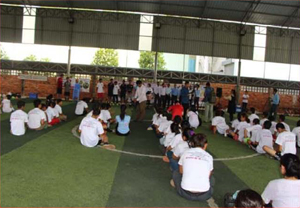
|
TV Interview concerning the children with Autism movements in Cambodia
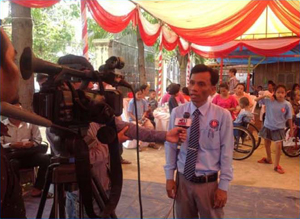
|
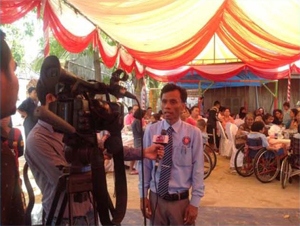
|
Adult of ID and Autism got training at APCD, Thailand
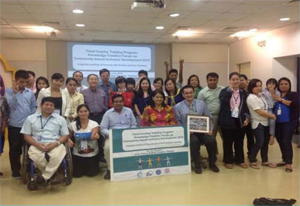
|
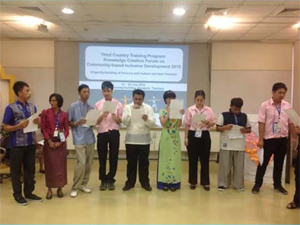
|
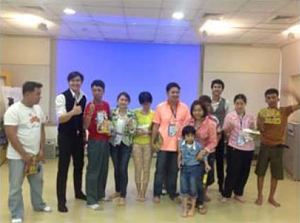
|
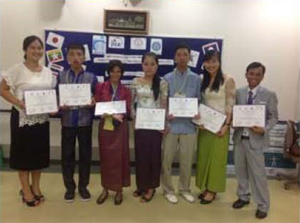
|
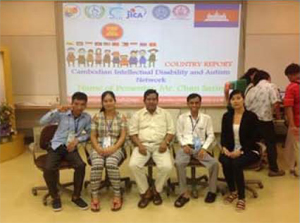
Conducted annual camping for children with ID and Autism, which presided over by Under-Secretary of State and Provincial Governor
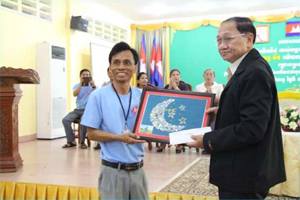
|
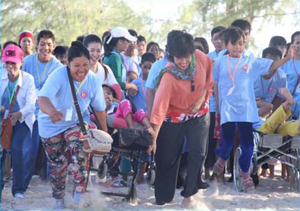
|
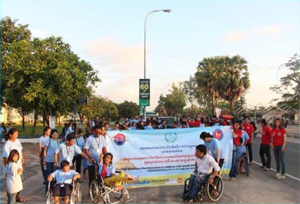
|
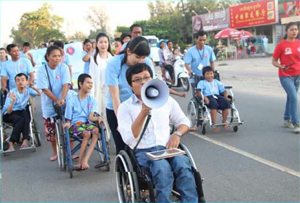
|
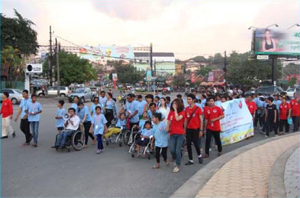
|
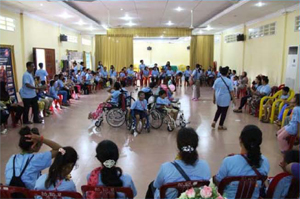
|
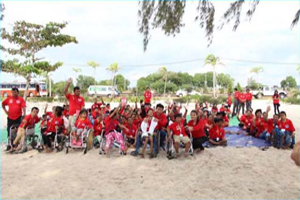
|
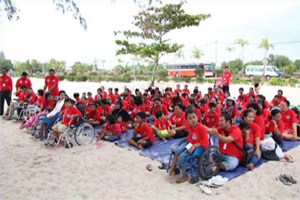
|
More than 150 people joint the Special Awareness on the street against discrimination for children with Autism in Cambodia ( participated by high official government)
4. Parents Support Group Program
HHC is presently working with 50 children with special needs, but only 32 parents are regularly engaged with Self-Help Group (SHG). The structure and constitution of the SHG is recognized by the commune council in Kampong Samnanh commune. The group meets monthly to discuss issues about child development and business management and is parent led, with elected chair, vice chair and treasurer. (see 6. Future Plans below)
- Monthly meeting - parents were encouraged to share issues, report on progress of their children especially those with autism. About 25 of 50 parents attend regularly for the meeting, however often parents want to rest as weekends and at other times they are busy working.
- Transform Asia donated 10 tons rice divided amongst 7-disabiity focused NGOs; 45 of the poorest HHC families each received 50kg.
- Parents appreciated the program. Issues discussed around: concerns that as their child gets older they are less able to care for them well; those children with severe disability tend to make slow progress; some facilities and resources are still difficult to access; many families live in poverty and sometimes don’t have sufficient food to eat.
- In July 25 parents visited 3- different business enterprises run by parents of CWID; these included quail raising, vegetable growing and running a grocery store. Parents appreciated learning from these opportunities and availed of a question and answer session.
- Monthly Parent Support Group (PSG) meetings were conducted, the aim being to share about the children’s progress, challenges, sharing information and making recommendations to the program. Most parents gained new experiences related to advocacy in the community, and many were confident to raise issues of discrimination in their locality.
- 2-parents volunteered to help at the DC, this also helping them to learn good practices which they are able to apply at home.
- The PSG gained income from the saving scheme totalling US$ 2,540; 14-families loaned funds from the group in order to start a small business to support their families; two families bought motorbikes to work as tuk tuk-drivers, one family selling vegetables at the local market; one raising quails for eggs and meat (see appendix 1); and one family borrowed funds to make repairs to their house.
- 23 families received a manual developed by Handicap International on ‘Functioning for Children with Disabilities and Development’.
- This year it is noted that parents and also community members participated more readily than in the past. HHC through its local presence and through invitation to officials and dignitaries has increasingly bought disability related issues to the fore. HHC promotes the view that disability is not an individual problem, or even a family issue, but a concern for the whole community to address. HHC believes in partnership and has therefore urged government and private officials to consider how people working together can ensure the rights of children are met.
- The first ever HHC Charity Event was conducted on 5th December. The event was organized by the META project, initiated by a former student volunteer who took part in the HHC Beach Camp 2014 and was motivated to raise support for CWID together with
student colleagues at CamEd and the Royal University of Phnom Penh. The charity concert invited three keynote CEO speakers and was presided over by HE Minister of Information. The audience was mainly students and aimed to raise awareness of disability and sharing business, whilst also raising funds for the proposed new HHC building. The speakers shared business experience and personal learning to students and parents of children with ID and Autism. Sponsors included: CDIDF/UNICEF CTN, CNC (Pizza company) ICE; COMPT; Cellcard Blu; My All in One Mall; Major Ciniplex; World Bridge Commerce; The Pizza Company; HUB; Akasa Studio; MY TV; Laren (newspaper); Platinum Cinemaplex.
Parent of children with ID and Autism Training activities
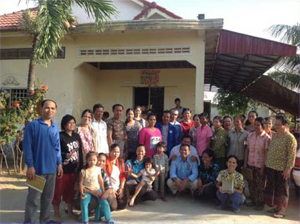
|
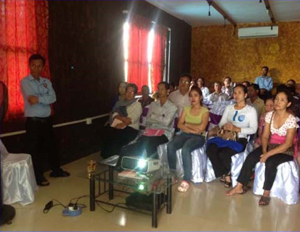
|
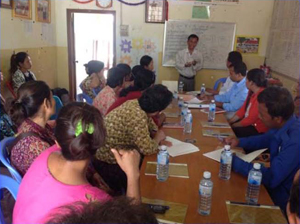
|
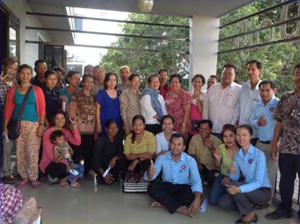
|
Parent of children with ID ad Autism got business training from business people through event, which presided over by H.E Minister of Information and his wife
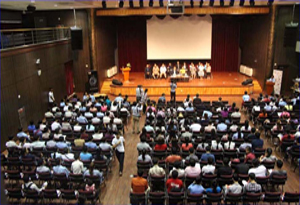
Minister of Information given speech and took photos with parents of ID and Autism
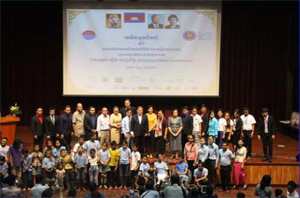
|
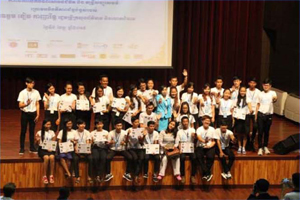
|
5. Toy Library Program
The toy library was established as a safe-place for child development where parents or students are able to borrow a variety of good quality toys, puzzles or games, designed to support a child’s development and promote learning through play, skill development and imagination. These toys can either be enjoyed at home with family, or in a group with other children either with or without disabilities. The Toy Library has encouraged togetherness of families through quality time spent playing, learning and growing together.
- 27 children with disabilities at day-care and approximately 100 students within a local school had opportunities to access the toy library and were happy to learn and play together.
- 23 children in HBC also accessed the mobile toy library, approximately 300 local school students and communities around HHC target areas had opportunities to access the mobile toy library and were happy to learn and play
- At least 3 times a week 27 children in daycare were able to access the toy library with support from staff and volunteers. Each group is allowed 30-45 minutes playtime, 2-3 children per session. One or two volunteers are needed to stand by in the toy library to make sure there is good coordination of play activities.
- World Play-Day (WPD) was celebrated on 28th May 2015 at the DC with 45 children and 25 parents in attendance. The event was presided over by H.E Nhem Morokat, and more than 80 local people participated. WPD is aimed to promote the importance of play - how children learn, and ensuring that it is fun as well as educational. HHC believes that the games children play are directly linked to the needs of their growing bodies and minds; if play is a child's work, then they must also have the tools for their trade. Toys are tools that help a child to enjoy learning.
- Mr. Takamura representative from the Japanese Toy Foundation conducted toy orientation training, this included a visit to the mobile HHC Toy Library project and spending time with students to help them experience various toys.
- The Japanese Toy Foundation made a commitment to support HHC Toy Program US $3,000- 4,000 per year in order to continue the program for children in the communities, including local schools in the target areas.
- Members of the Taiwanese and Malaysian Toy Library Associations donated various toys to HHC and also visited the community program.
- HHC was in regular contact with the Korean, Japanese, and Taiwanese Toy Library Associations for improving the toy library program in Asia and Pacific region.
Activities of Toy Library Program at daycare and Mobile Toy and the communities
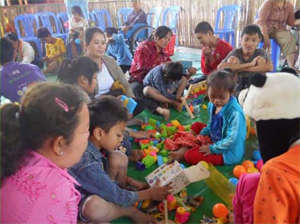
|
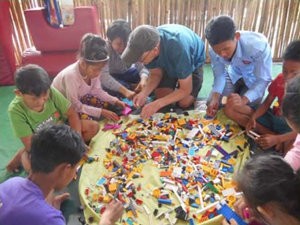
|
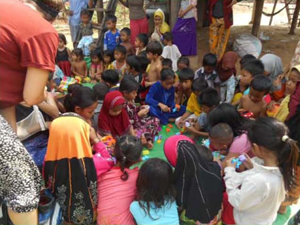
|
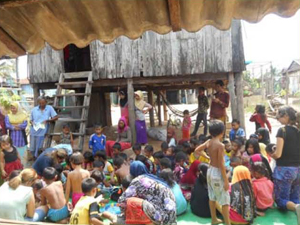
|
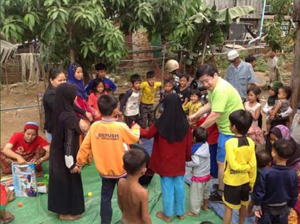
|
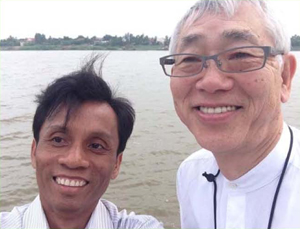
|
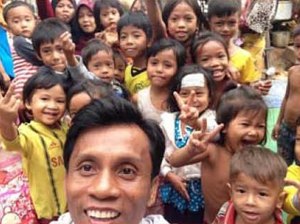
|
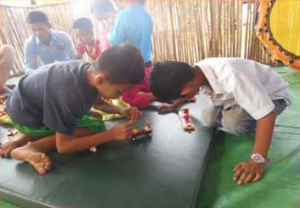
|
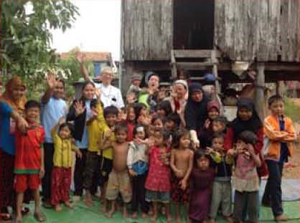
6. Inclusive Education Program
‘Inclusive Education (IE) seeks to address learning needs of all children, youth and adults with a specific focus on those who are vulnerable to marginalization and exclusion. IE includes provision of capacity building to local teachers to be able to respond to children’s needs through the national plan of MoEYS. HHC has worked with 5-7 local schools in order to implement IE of 8 children (2-girls, 6-boys) with physical disabilities. These children are supported with school materials and are visited monthly to monitor their progress and connect with the teachers/principal over any issues relating to the children’s education. Families are also visited to encourage school attendance and support in cases of discrimination or other social issues affecting their child.
- Staff conducted a 3-day training in September on IE curriculum – involving 25 teachers, at Kompong Samnanh Hun Sen primary school; the Provincial Department of Education (PoE) provided a briefing; the HHC director presented on the disability movement and National Action Plan (sponsored by UNICEF and Australian donor).
- A second training was conducted in October, HHC again collaborated with the Provincial department of Education (PoE) with 51 local teachers in attendance from Takmao Primary school (this training sponsored by Life Giving Network and Australian friend).
- Both school principals in the target schools committed to follow-up teachers after the training to ensure application of learning. Schools were provided with copies of the MoEYS curriculum.
- Banners promoting disability awareness slogans were distributed in 5-primary schools. The message on banners focused on inclusive development and quality of education for everyone, this included, reducing discrimination among local people.
- Regular meetings with the provincial department of education were constructive in monitoring children’s school attendance and ensuring those with special needs are able to access services – school, DC or HBC.
- Three boys: one with muscular dystrophy, one cerebral palsy; one with intellectual disability (possible development delay) were able to access regular half-day school program spending the remainder of the day at DC.
- All children learning through the IE program were provided school materials, such as pen, book, notebook, uniform and bag.
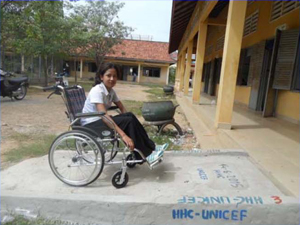
|
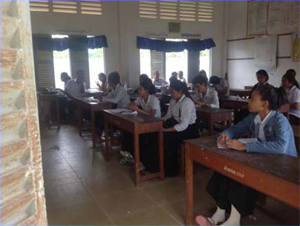
|
Activities of Inclusive Education Program in Kandal province
7Training 76 local teachers of inclusive education
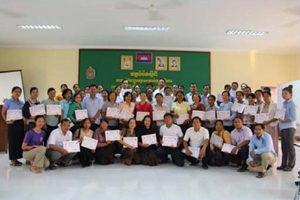
|
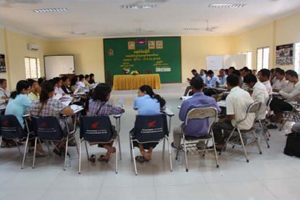
|
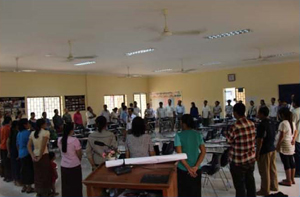
|
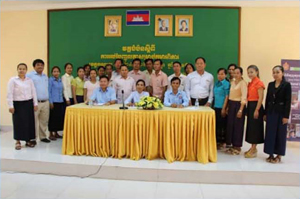
|
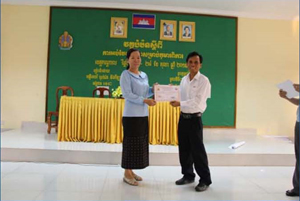
|
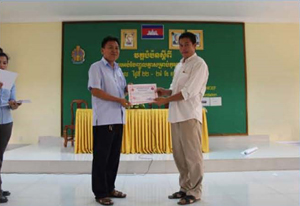
|
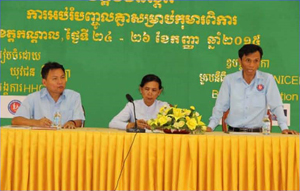
7. Major Achievements related to Management and Governance
- Increased emphasis on implementing child-protection throughout the organisation child-to¬child, visitors and staff conduct have all improved.
- 4 Board meetings conducted – these focused on current issues, program funding, and development of volunteer policy, review internal rules; legalities and planning for new purpose built day care premises.
- HHC was donated a plot of land 1,371M square, (21x63m) by HE and Mrs. Kanirith Minister of Information, Svay Rolum Commune, Takmao municipality. The plot will require backfilling and an access road, however it is anticipated that various private donors will contribute. Legal consultation and architect services have been provided gratis for the project.
- The HHC Director led a team of 15 NGO staff working in the disability sector (KPF-7, DDSP-3, HHC-4, Hagar-1), on a 5-day exposure visit to Christian Care for Children with Disabilities (CCD) program in Thailand. CCD organisation has more than 25-years experiences working with the Thai government and has been awarded official recognition for its work. Key learning included: importance of protection for children –speaking appropriately, deepening understanding for the well-being of children. The CCD CBR work was particularly informative on how to improve strategies for working effectively with parents and communities, increasing their participation and contribution, with CCD acting as facilitator in this process.
- In addition the team used the opportunity to visit and learn from APCD for the development project, which since inspired the formation of Cambodia Intellectual Disability and Autism Network (see detail below). HHC will share learning and training to parents, visit participants providing testimony and case studies from CCD experience about how engagement in the network has changed their program to better address issues specific to autism.
- From 2013-14 onwards through meetings with Japanese and other Asian counterparts in the intellectual disability sector, notably the Vietnamese Autism Network, Autistic Thai Foundation, Asia-Pacific Development Center on Disability (APCD), the HHC Director was inspired to develop a platform specific to the needs of parents and children with autism. Interest was further developed through a meeting with disability sector colleagues including CCAMH, KPF, CAMYOD and PACHID then with wider consultation with APCD and the NGO sector from which a concept paper was developed. Following a series of meetings with the Disability Action Council authority was given to conduct a workshop and launch of the Cambodia Intellectual Disability and Autism Network (CIDAN) this event jointly organized by NGOS and DAC which supported by APCD. On 31-March-1st April 2015, 14 NGOs (162 parents and children) including representatives from UNICEF and UNDP participated in the launch-workshop event; this included 6 key note speakers - HHC director, KPF, Rabbit school, CCAMH, the Ministry of Education and MoSAVY. An election amongst the CIDAN members was conducted resulting in NGO representatives from CCAMH, KPF and HHC and parent representatives (from Camyod, Hagar and DDSP). CIDAN is now nationally recognized as the authority on Autism/Intellectual disability working in alliance with the government.
- The forming of CIDAN is an exemplary example of the commitment of individuals, parent-groups, NGOs and government representatives working collaboratively to recognize the special needs of a particularly vulnerable group (in this case persons with autism) and to begin a movement designed to increase knowledge of and appropriate responses to this disability
- Staff retreat and program reflection have been conducted 3 days in order to move forward and set priority for new plan for 2016, this included staff can be relax and enjoy at the beach to release the stress
Pictures of board meeting
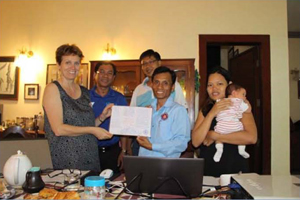
|
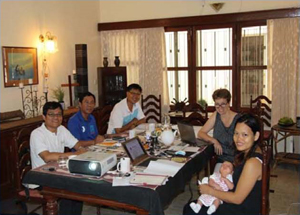
|
Pictures of staff retreat
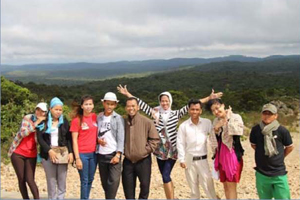
|
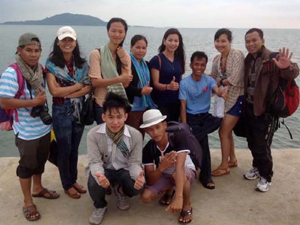
|
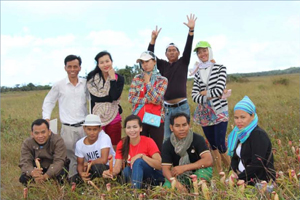
Our new Land Picture given by minister of information and his wife
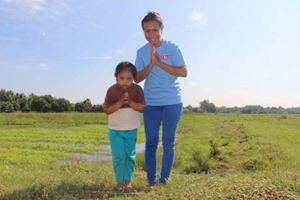
|
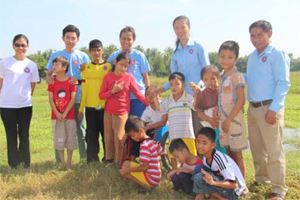
|
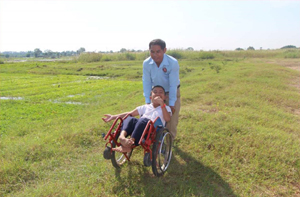
8. Budget Narrative
The following budget lines were under expended:
Picture of staff training in Bangkok, Thailand
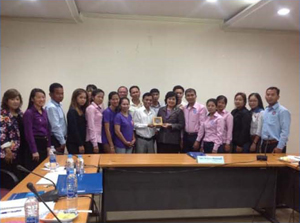
|
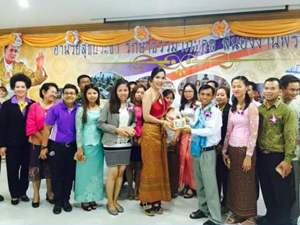
|
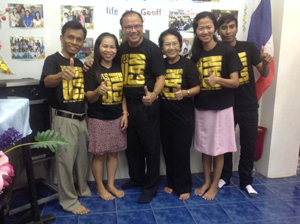
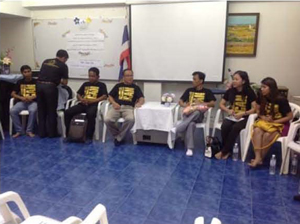
|
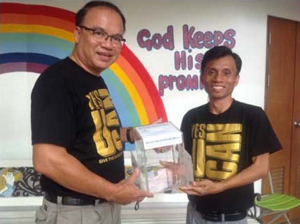
|
CIDAN members visited APCD. Warmest welcome by APCD leaders
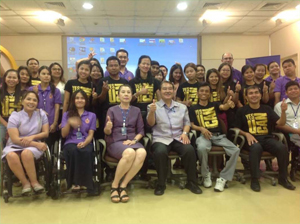
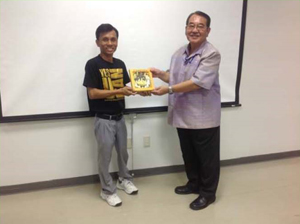
|
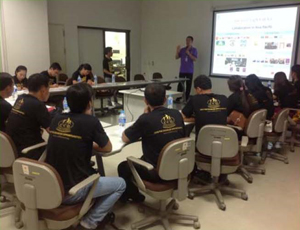
|
9. Challenges
As with previous years the Day-Care (DC) facility has continued to flood during the wet season. This year the facility is increasingly inadequate with the numbers of children attending. Other issues include a termite infestation that continues to destroy the interior and as the facility is located on a ‘blind corner’ there are regular motorbike accidents outside the gate that are disturbing to both children and staff alike. In the latter part of the year the landlord indicated that he wished to sell the property and has since requested an increase in rent. Therefore, HHC was extremely grateful to receive a very kind offer from HE Mrs. Khieu Kanharith for the donation of land to construct a purpose built facility. HHC will vacate the present premise in February 2016 and move to a temporary facility loaned for 18-months by the Provincial Governor and Provincial Department of Education, whilst construction takes place on the new facility.
- The increasing workload placed on the HHC Executive Director is a concern for the board and other stakeholders. Increasingly he has been engaged with high-level advocacy and with the launch of CIDAN and other initiatives to promote disability awareness, the programming aspects of HHC are not being adequately supported. In order to address this issue in 2016 the board proposes to employ an assistant director with the ability to oversee much of the day to day programming, whilst also supporting the ED through delegation of certain duties and responsibilities.
10. Contact Information
Cambodia Office
Mr. Chan Sarin, Founder/Executive Director Address: #B6EO, Toul Kork, Sankat Toul Sangke, Khan Russey Keo, Phnom Penh Cambodia Office phone (+855) 23 864 291 website: www.hhccambodia.org
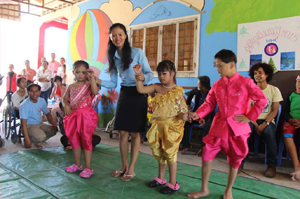
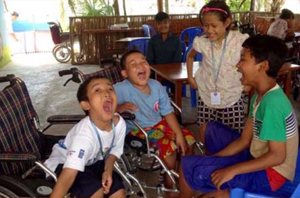
|
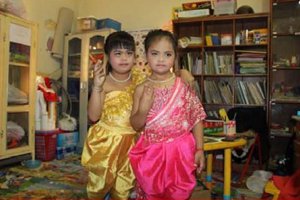
|




